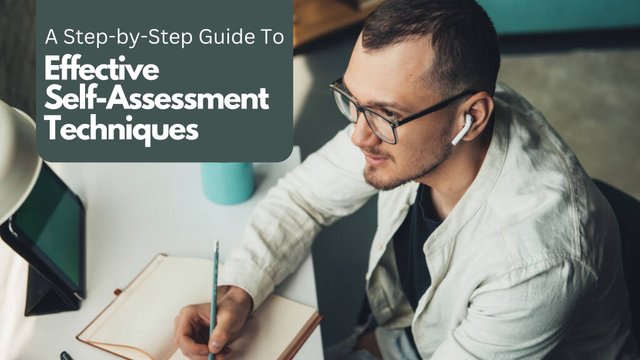A Step-by-Step Guide To Effective Self-Assessment Techniques

Self-assessment is a vital component of successful career planning and development. By taking the time to understand your strengths, weaknesses, interests, and values, you can make informed decisions about your career path and set achievable goals. This step-by-step guide will walk you through various self-assessment techniques to help you gain clarity and confidence in your career journey.
1. Start with Reflection:
Begin by reflecting on your past experiences, achievements, and challenges. Consider what activities or tasks energize you and which ones drain your motivation. Think about your proudest accomplishments and the skills you used to achieve them.2. Identify Your Skills:
Make a list of your skills, both technical and soft. These can range from communication and leadership to specific technical abilities. Be honest about your proficiency level in each skill.
3. Assess Your Interests:
Explore your hobbies, interests, and passions. Consider how these interests align with potential career options. Think about the tasks you enjoy and could see yourself doing on a daily basis.4. Clarify Your Values:
Define your core values – the principles and beliefs that guide your life decisions. Identify what matters most to you in a career, such as work-life balance, job stability, creativity, or social impact.5. Personality Assessment:
Take a personality assessment to gain insights into your personality traits, strengths, and potential career matches. Tests like Myers-Briggs Type Indicator (MBTI) and Big Five Personality traits can provide valuable information.
Vati offers insightful career assessment tools to help you discover your strengths, interests, and values. By analyzing your aptitudes and preferences, you can make informed decisions about your career path. These assessments guide you towards opportunities that align with your passions and talents, ensuring a rewarding and successful journey.
6. Seek Feedback:
Ask friends, family, colleagues, or mentors for feedback on your strengths and areas for improvement. Sometimes, others can provide a more objective perspective on your abilities.7. Set Goals:
Based on your self-assessment, set short-term and long-term career goals. These goals should align with your skills, interests, and values. Make them specific, measurable, achievable, relevant, and time-bound (SMART).8. Research Career Options:
Explore <a href=https://vati.io/career-guide/top-10-highest-paying-jobs-career-option-in-the-world-2023/"">various career options that resonate with your self-assessment results. Look into industries, job roles, and companies that align with your goals and interests.
9. Consider Education and Training:
Determine if additional education, certifications, or training are needed to achieve your career goals. Research programs and resources that can enhance your skills.10. Create an Action Plan:
Develop a step-by-step action plan to achieve your career goals. Break down your plan into smaller tasks and set deadlines to keep yourself accountable.11. Networking:
Build and nurture your professional network. Attend industry events, workshops, and seminars to connect with individuals who can offer insights and opportunities.12. Experiment:
Don't be afraid to try new things. Internships, volunteering, or freelance work can provide hands-on experience and help you gauge if a certain career path is the right fit.13. Review and Adjust:
Regularly review your goals, self-assessment, and progress. Adjust your plan as needed based on new insights, experiences, or changes in your career landscape.14. Stay Open-Minded:
Be open to unexpected opportunities and changes. Your career journey might take different turns, and staying flexible can lead to exciting avenues.15. Seek Professional Guidance:
If you're unsure about your self-assessment results or career choices, consider seeking guidance from career counselors or coaches.In conclusion, effective self-assessment is a cornerstone of successful career planning. By gaining a deep understanding of your skills, interests, values, and personality traits, you can make informed decisions that align with your aspirations. This step-by-step guide provides you with the tools to embark on a purposeful and fulfilling career journey. Remember, self-assessment is not a one-time task; it's an ongoing process that evolves as you grow and develop in your career.